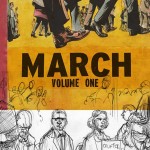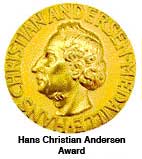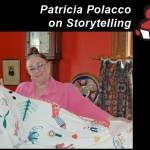 The whole thing started in 2008, when I was working as Congressman John Lewis’s press secretary during his primary campaign.
The whole thing started in 2008, when I was working as Congressman John Lewis’s press secretary during his primary campaign.Guest Bloggers: Andrew Aydin and Nate Powell
 The whole thing started in 2008, when I was working as Congressman John Lewis’s press secretary during his primary campaign.
The whole thing started in 2008, when I was working as Congressman John Lewis’s press secretary during his primary campaign.

 In an effort to build awareness about the remarkable books written for children and teens across the globe,every two years the International Board on Books for Young People (IBBY) selects one author and one illustrator as the winners of the Hans Christian Andersen Award. This recognition is considered by many to be the world’s most prestigious in children’s publishing. Maurice Sendak, for example, is the only illustrator from the United States to ever win this award.
In an effort to build awareness about the remarkable books written for children and teens across the globe,every two years the International Board on Books for Young People (IBBY) selects one author and one illustrator as the winners of the Hans Christian Andersen Award. This recognition is considered by many to be the world’s most prestigious in children’s publishing. Maurice Sendak, for example, is the only illustrator from the United States to ever win this award.
 An interactive whiteboard is a fabulous classroom tool that brings multimedia to the forefront of literacy and library lessons. By shifting the instructional focus from a teacher presentation to classroom-wide engagement, a whiteboard encourages participation and discussion while supporting kinesthetic learners.
An interactive whiteboard is a fabulous classroom tool that brings multimedia to the forefront of literacy and library lessons. By shifting the instructional focus from a teacher presentation to classroom-wide engagement, a whiteboard encourages participation and discussion while supporting kinesthetic learners. I'm a writer because I never had the Creative Writing Class. You know the one I mean, the one that exhorts, "Write what you know. Write from your own experience." If I'd been limited to writing what I know, I'd have produced in these past forty years one unpublishable haiku.
I'm a writer because I never had the Creative Writing Class. You know the one I mean, the one that exhorts, "Write what you know. Write from your own experience." If I'd been limited to writing what I know, I'd have produced in these past forty years one unpublishable haiku.